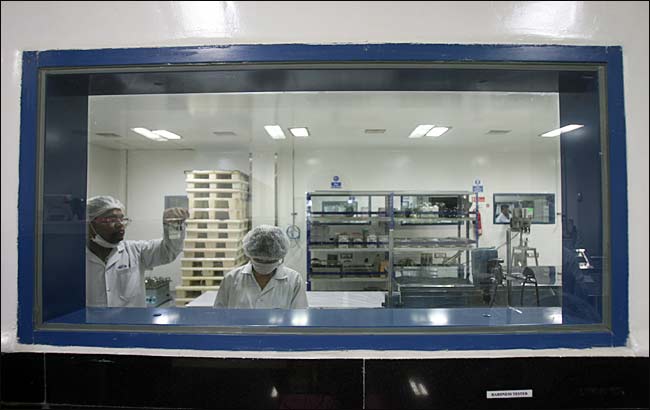JULY 27, 2012 BY MIKE PALMEDO LEAVE A COMMENT
This blog is a summary of a July 25 satellite event at the XIX International AIDS Conference titled “The Future of Affordable Antiretroviral Treatment: Trends in Patents and Price.” The event was hosted by the Medicines Patent Pool (MPP). Powerpoint slides are online at http://pag.aids2012.org/session.aspx?s=319
Pedro Esgueira from the International Dispensary Association (IDA) foundation presented “Intellectual property-related challenges in the procurement of antiretrovirals: the perspective of a procurement agency.” His agency provides essential medicines to 160 million people, and regularly faces obstacles to antiretroviral delivery due to intellectual property rights. These include:
Seizures by customs officials, including those in the Netherlands, Estonia, and the Ukraine. As a result, IDA has had to reroute some of their medicines through less efficient transit hubs.
Limited sources of needed medicines. IPRs can block new entrants to the markets, even when there are bilateral voluntary licenses for generic production.
Lack of clarity regarding patent status and/or licensing status. For example, only one generic firm in Azerbaijan had a license to supply TDF+FTC, and it was unsure what the terms of the license permitted it to do.
High prices due to monopoly or restricted competition. This often puts patients on hold and makes second or third line drugs out of reach.
General delays and transactions costs. If there is a delay, IDA may be forced to go to the branded supplier, and the price can be significantly higher.
Political pressures that keep recipient countries from using TRIPS flexibilities, which forces IDA to purchase more expensive branded products. For example, El Salvador chose not to issue a compulsory license for political reasons.
Esgueira said that what has helped IDA deal with these obstacles is the use of TRIPS flexibilities; the MPP database and its voluntary license with Gilead; and WHO prequalification of medicines. His recommendation for overcoming the obstacles faced by IDA are:
Greater transparency of patent status and license terms in freely accessible public databases
Patent owner responsibility to disclose relevant information
More workshops on IP and the use of TRIPS flexibilities
Continued debate on redesigning the current research and development / IPR regime
More licensing to the MPP.
Gracia Violeta Ross Quiroga presented “Intellectual property-related challenges: a Latin American perspective.” Most countries in Latin America are categorized as middle income, so they are not a priority in global policymaking. There have been some countries that have done a great job in providing access to treatment, but the successes of some mask failures of others.
Concerns for treatment access in Latin America include:
High income inequality
Increased need for second and third line treatment due to first line treatment failure
High level of patenting of ARVs in the region
The patent situation is the worst in bigger countries with relatively high incomes that are considered to be potential markets for the branded firms. People living with HIV/AIDS often still lack the resources to buy medicines in countries where macroeconomic indicators rise.
ARVs are even patented in countries viewed as small markets (like Bolivia)
Many countries have already signed FTAs with TRIPS-Plus provision
Patents in India will also block access to antiretrovirals in Latin America that have Global Fund support
The Medicines Patent Pool is one mechanism (among others) that can help Latin America achieve universal access. However, it is a mechanism for bilateral licenses with pharmaceutical companies, and many company licensing policies do not include Latin American nations. It is important to address the terms of the licenses so that we can maximize the number of people who benefit.
Treatment advocates need to continue to work on intellectual property issues, as well as funding. Greater training on IPR and access to medicines is needed for people at the grassroots level.
Lihle Dlamini from the Treatment Action Campaign (TAC) presented “Mechanisms to address IP related challenges: the Experience of South Africa.”
TAC was born in December 1998 out of the need to supply antiretrovirals to people with HIV. At the time, a first line regime cost R75000 per patient per year (based on the average 1998 exchange rate, this is USD 13,656). Prices elsewhere had fallen, but South Africa couldn’t access the lower priced drugs due to patent issues. Early campaigns included mobilizing against a lawsuit by big pharma against a South African law that legalized parallel imports; the illegal importation of generic fluconazole from Thailand; and a 2003 competition law challenge against the prices of AZT and nevirapine.
TAC currently has a “Fix the Patent Law” campaign launched in 2007 to pressure the South African government to utilize all trips flexibilities. South Africa currently grants the highest number of pharmaceutical patents in comparison to other developing countries . These are often granted without proper examination. Researchers say that 80% of the patents issued in South Africa would not be granted if applications were examined. Therefore, the campaign is advocating for 1) stricter standards of patentability; 2) requiring proper patent examinations; and 3) establishing opposition procedures.
In 2012, TAC met with the Medicines Patent Pool to discuss disputes over the terms of the voluntary licenses reached with Gilead. Also discussed were concerns that the Pool was undermining efforts to achieve more fundamental changes to the global intellectual property regime through the greater use of TRIPS flexibilities.
Denis Broun from UNITAID discussed the issues that the organization considers when determining whether new generic firms can really enter the market and begin delivering medicines. The major problems faced by firms are access to raw materials (APIs); access to tech and know-how; the legal right to manufacture and get stuff on markets; and the ability to meet standards and to register their products.
Access to APIs. There are few firms that manufacture APIs, and generic firms can face patents or contract license issues. Companies with the exclusive APIs may end up using it to gain a competitive edge or to influence the market. For instance, nine years ago Abbotts’ price hike for ritonavir led to Kaletra dominating the market for ritonavir-boosted protease inhibitors.
Access to technology. The technology needed to manufacture medicines is protected by patents as well as by tacit knowledge. Licenses for the technology can come with a whole set of constraints related to its use. In some cases, you have situations where you could obtain a compulsory license, but lack the technology to bring the drug to the market.
Legal right to manufacture. Patents are still obstacles, and the patent landscape is changing. Many countries implemented TRIPS before they were required to do so, and it is among these countries that you find the most restrictive patent laws. Most new medicines now are patented in developing countries, and there are more patents per drug than there used to be. Patents are an even bigger problem for combination precuts, because the combination tends to be protected in more countries than the individual components. Other types of IP barriers to manufacture include data exclusivity and linkage.
Ability to meet standards and register. It is important that countries have fair and competent regulatory authorities. Many do not.
These types of obstacles are exacerbated by the trade agreements that are under negotiation. TRIPS flexibilities are important, and it is bad to undermine them.
Mariângela Simão from UNAIDS presented “Strategies for overcoming patent-related challenges in the generic industry: Different mechanisms to address intellectual property challenges.” She noted that treatment coverage has risen but we still have a long way to go, and that prices are still too high – especially for second line drugs. In some countries 25-30% of patients are already on second line. The vast majority of people with HIV/AIDS live in middle income countries, and the proportion is growing. However, many industry (and other) access policies are based on access for low income countries. A new approach is needed to ensure increased coverage for everyone, including those in upper-middle income countries.
There should also be no double standards regarding drugs prescribed in one region versus another. People in all regions benefit from drugs that are simpler to use and less toxic. Heat-stable drugs are good for patients no matter where they live.
UN agencies should continue to support countries on the use of TRIPS flexibilities and should continue to advise countries to avoid TRIPS-Plus measures in trade agreements.
Strategies for reducing costs of treatment include voluntary license mechanisms like the MPP, compulsory licenses, patent oppositions, and taking steps to avoid granting patents that shouldn’t be patented in the first place.
Chan Park of the Medicines Patent Pool presented “Addressing innovation and access though voluntary licensing: the MPP.” He noted that the patenting of antiretrovirals has increased in developing countries, and that newer drugs are more widely patented. This is true for first and second (and third) line drugs. There are also more follow-on patents. When you consider both the original and follow on patents on important medicines, patent expiry can be 10-15 years away.
The situation is more complicated when you get into fixed dose combinations (FDCs), where a patent on one component can block the whole product. The Patent Pool has found patent barriers on nine of eleven WHO-recommended FDCs, and all seven FDCs under development face patent barriers.
Mechanisms that can overcome patent barriers include taking full advantage of TRIPS flexibilities, as well as using voluntary licenses for generic production.
There are concerns that voluntary licenses are secret because only the basic features are disclosed. There are a wide range restrictions in the licenses that can negatively impact access. Licenses are often given to a few hand-picked manufacturers. There are no voluntary licenses on a number of products, and there are licenses with very restrictive terms on others.
The MPP currently has licenses with two patent holders and is in negotiations with four others. The core principles for MPP licenses are:
public health, pro-access perspective
reach as many people living with HIV as possible
terms and conditions should be consistent with TRIPS flexibilities
improve industry norms for voluntary licensing
manage licenses with a public health focus
work with partners to promote the development of needed formulations
The MPP aims to accelerate the availability of generic versions of new medicines, enable the development of FDCs, and enable the development of new formulations (i.e. – pediatric, heat-stable, etc.) It does sub-licensing work to ensure that the generic companies actually get drugs on the ground. It also provides a patent status database that includes data collected for 24 HIV compounds in 76 low and middle income countries.
Park listed the main achievements of the MPP:
Unprecedented publication of full text of licenses
Patent transparency on what HIV medicines are patented in which countries
Licenses from two patent holders and four more currently under negotiations
Higher standard on the number of countries covered by licenses (but there is still room for improvement)
Recognition of the importance of licensing medicines as early as possible (in pipeline)
Showing that voluntary licenses are TRIPS compliant
He listed the following as what still needs to be done:
obtain licenses from more patent holders
expand the number of countries benefiting from licenses
enable development of more FDCs and new formulations
enhance diversification of the manufacture of antiretrovirals



